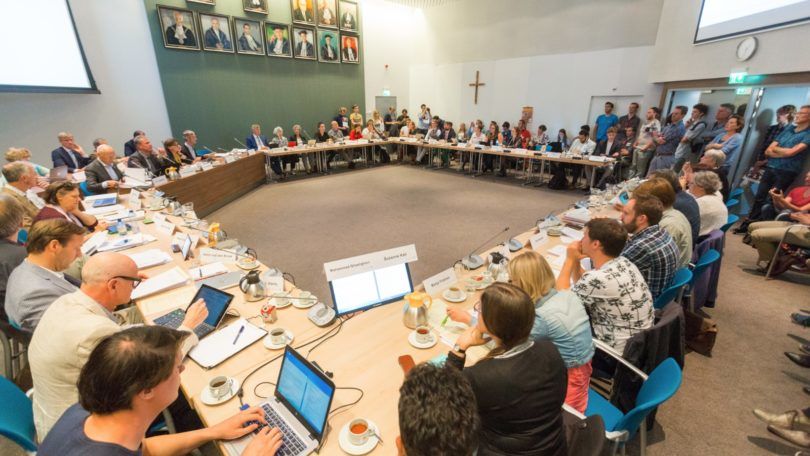Major disagreements on new Code of Conduct and Integrity during Joint Assembly
-
 The council meeting in action. Photo: Marjolein van Diejen
The council meeting in action. Photo: Marjolein van Diejen
The Code of Conduct and Integrity for employees has led to intense debate between the executive board and the Works Council, as became evident yesterday during the Joint Assembly. The Works Council has some fundamental issues with the concept submitted by the executive board, but according to the board, those complaints come a bit too late. The subject will be postponed to a later meeting.
The goal of the Code of Conduct and Integrity is to improve the work environment at Radboud University. Among other things, the text is meant to prevent a recurrence of situations like those at the Faculty for Philosophy, Theology and Religious Studies last year, when 29 reports regarding social safety were filed.
The code focuses on what is considered integrity within Radboud University, and what kind of behaviour is and is not appropriate. In this way, the document is supposed to contribute to an inspiring, enjoyable and safe work environment.
External Relations
The Code of Conduct has been in the works for some time. Last summer, the executive board discussed a concept version with the board of deans, and then with dozens of other employees. This resulted in a six-page document which addressed, among other subjects, ‘communal values’ and ‘specific rules regarding behaviour’. The text includes attachments concerning alcohol and drugs, personal relationships in the workspace, and the use of social media.
For example, under the header ‘do’s and don’ts for social media’, the concept version reads: “Be authentic. The online world is not detached from the real one, so make sure to be the same person you are offline.” Employees are also advised to clarify whether they’re speaking as a university employee or as a private person. “Be aware that people could always view you as a university employee, even in your free time.”
‘Even in your free time you can be regarded as a university employee’
The attachment concerning ‘personal relationships’ discusses relationships between employees, as well as external relations such as customers, contractors or suppliers. The text states that employees should report to their supervisor as soon as possible if they have both a professional and a personal relationship with an external relation.
Proposal Withdrawal
The executive board put the code of conduct on the agenda of the Joint Assembly, which took place yesterday via Zoom. To the dismay of the Works Council. ‘Our presidium asked to withdraw the proposal before the meeting’, according to Peter van der Heiden, speaking in the Joint Assembly on behalf of the FNV. ‘Our issues with the document are a matter of principles, rather than details. That is why I ask you to withdraw the document and return with a new variant at the earliest convenience.
‘Our problems with the document are fundamental in nature’
Rector Magnificus Han van Krieken was visibly irritated. Van Krieken: ‘We asked you to cooperate [with the code of conduct, ed.] in the preparatory stage, and you refused.’ A misrepresentation, according to the Works Council: they were willing to cooperate, just not on the terms set by the board.
Putting Out Fires
Eventually, the contents of the concept-code were discussed after all. Van der Heiden criticised the fact that different kinds of personal relationships, such as between relatives or personal relationships between employees, are all lumped together. ‘Right now, the wording is way too broad’, so Van der Heiden. ‘There is only one relevant relationship; that is the intimate dependant relationship between employees or between an employee and a student.’
Van Krieken disagreed on this point. According to the rector, it is very clear to everyone that a relationship between a teacher and a student is unacceptable. According to him, the code of conduct is intended for more ambiguous cases. ‘For example, we’ve received a lot of questions [from employees, ed.] about family- and business relationships.’
Furthermore, the arrangement concerning social media is also way too broad, so Van der Heiden. According to him, the policy could be summarized in a single sentence: ‘University employees use social media in a personal capacity, unless they use a Radboud University medium.’ Finally, Van der Heiden also criticised the text regarding alcohol and drugs. According to him, the text was of an entirely repressive nature, rather than focusing on offering aid and assistance.
In the end, it was decided to stop the discussion in the Joint Assembly. Chair Daniel Wigboldus tried to put out the fire by suggesting that the executive board would consider the next steps. ‘We would like to move forward with a code of conduct, because of the sense of responsibility we feel for our employees and students’, according to Wigboldus. ‘The same goes for us’, Van der Heiden concluded.



